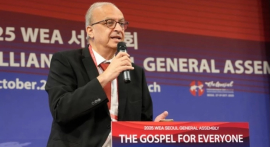
According to a new report, the states with the lowest religious freedom scores were Michigan (22%), Vermont (23%), Delaware (25%), Washington (26%), and Maryland (27%).
On Monday, the Napa Legal Institute released its 2025 Faith and Freedom Index, which rates each state from 0–100 based on protections for religious nonprofit organizations, combining a state’s “religious freedom score” and its “regulatory freedom score.”
A state’s religious freedom score reflects factors such as constitutional free exercise protections, whether a Religious Freedom Restoration Act exists, religious freedom conditions for nonprofits with public programming and for faith-based employers, protections for religious exercise during a state emergency, and the presence of state Blaine Amendments.
Regulatory freedom scores weigh elements such as a state’s nonprofit religious corporation law, prior notice and consent requirements for major corporate actions, director standards of conduct for religious organizations, charitable registration law, audit requirements tied to charitable registration, corporate income tax and exemptions, sales and use taxes and exemptions, and property taxes and exemptions.
In a statement on the 2025 Faith and Freedom Index’s release, the Napa Legal Institute singled out Michigan and Washington as states that “over-burden and are even hostile towards faith-based nonprofits.”
Conversely, Alabama (86%) and Kansas (79%) topped the religious freedom category, followed by Mississippi (67%), Georgia (67%), and Florida (63%), with the Institute praising Alabama and Kansas for their “exemplary protections for faith-based nonprofits that other states should emulate.”
In the regulatory freedom category, Indiana and Montana led with scores of 82% and 80%, respectively; Iowa (79%) and Arizona (77%) also ranked near the top, while Texas (76%) and Wyoming (76%) tied for fifth; at the bottom, Illinois posted 40%.
Other low performers in regulatory freedom included Michigan (45%), Massachusetts (48%), South Dakota (49%), and Washington (49%).
Overall, Alabama (72%) and Kansas (69%) recorded the highest composite scores, with Indiana (68%), Texas (65%), and Mississippi (63%) also ranking high.
The report praised Alabama for “strong constitutional protections for free exercise of religion, a state constitutional amendment requiring government burdens on religious exercise to satisfy strict scrutiny, and an automatic exemption from state corporate income tax for organizations with federal 501(c)(3) status.”
At the other end, Michigan (31%) and Washington (35%) had the lowest overall scores, with Massachusetts at 37% and Illinois, Maryland, and West Virginia each at 38%.
The report criticizes Michigan for its “broad Blaine Amendment,” which bars religious organizations from receiving state funding, and for “nondiscrimination laws regarding public accommodations and employment that include no meaningful exemptions for religious organizations.”



















